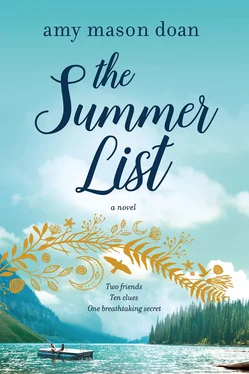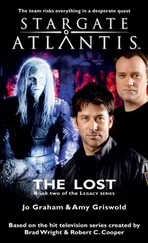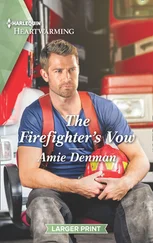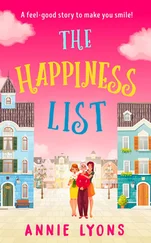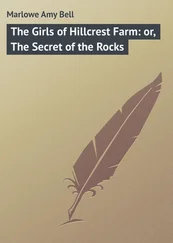1 ...7 8 9 11 12 13 ...17 “Laura,” she said, cupping my jaw in both warm hands.
“Mom.”
“Oh, I’m just excited. Your first friend in the new town. I’m sorry, Laura.”
“It’s okay.”
It wasn’t exactly okay, though. I didn’t know where to look. She still had both hands under my chin and her gray eyes were darting and circling, scanning my features.
“Careful, Laura, she wants you to sit for her. When she analyzes someone’s face like that, she’s making plans. And it sucks, believe me.”
“You caught me.” Alex dropped her hands and stepped back. “Laura, you’re welcome here anytime.”
Some people pronounced my name Low-ra, and some people said Laah-ra, and neither was correct. It was just Laura, standard pronunciation.
Alex said it like there were three syllables, not two, adding a breathy cascade within the vowel. Lau-aura. She said it like a declaration, like I couldn’t possibly be anyone else, and like meeting me confirmed that I was just as wonderful as Casey had said.
“I’m starved and you’re freaking out my friend.” Casey was already running to the back door. She was barefoot, wearing her purple bathing suit, but she’d pulled on cutoffs for the occasion.
Alex didn’t speak as we walked up the path together, and as she held open the screen door, she watched me closely again, her eyes monitoring my face for a response as I took in the fixed-up house.
She’d transformed it. Newly white walls brightened up the long room and set off the blue of the lake and the green of the pines coming through the small, high windows and screen door. There were the antiques I’d heard about—a circular wooden table and chairs near the tiny kitchen, a deep armchair on a braided oval rug next to the fireplace, and a low yellow daybed had replaced the futon in one corner. But she hadn’t sanded away the marks in the floor from the old bunk beds, I was relieved to see.
“Like it, Laura?” she said, fidgeting with the hem of her white eyelet tank top.
“It’s perfect.”
“You did a good job, Mom,” Casey said from the kitchen table, a croissant hanging from her mouth. “Now can you two please stop being so freaking polite so we can eat?”
* * *
When Alex was in the kitchen slicing an almond pastry, Casey whispered across the small table, “I’ve never seen her so quiet. She must really want to paint you. Watch out.”
“I don’t mind.”
* * *
Alex was more relaxed each time I came over. She stopped saying my name more than the standard amount, and began to match Casey’s description. She did talk too much. She did launch from one hobby to another so fast it was hard to keep up.
And she did want to paint me. I chalked up her odd behavior on that first morning to the overwhelming impression I’d made as a potential subject, and I was flattered.
By midsummer we’d settled into a routine. Mornings I sat for sketches on the back porch, muscles aching, but happy to let Alex and Casey entertain me.
One hot day in late July Alex had me in a stiff-backed dining room chair with my hair in a tight bun. She said she was trying to capture something in my eyes. That I was “an old soul but tried to hide it,” and she hadn’t managed to draw this to her satisfaction.
“You have a... What is it, Case? What’s in her eyes that’s so hard for me to get right? That bit of sadness mixed with... I don’t know what.”
“That’s a neck cramp mixed with the desperate need to pee. I know the feeling well.” Casey was sprawled in the sun by my feet, a paperback of Peyton Place tented above her face.
She read a section aloud: a couple writhing around, monitoring the status of the man’s erection, panting out a play-by-play of their lovemaking.
When Casey wasn’t acting out Peyton Place , making me laugh until I broke form, Alex would lecture us on her latest bird. Her birding mania had abruptly replaced a brief heirloom tomato kick. She’d even invested in binoculars and a leather journal for recording her sightings. Casey and I knew as much about the yellow-headed blackbird as the local Audubon Society.
“Their scientific name is Xanthocephalus ,” Alex said from behind her easel. “And the Tahoe basin has lost hundreds in the last ten years, isn’t that awful? Their call is so unusual. Like...a rusty gate opening over and over, and—”
“Oh, my God, Mom. You’re a rusty gate opening over and over. Give it a rest.”
Alex popped her head above her easel. She had her curls piled on top of her head, and a double pine needle had fallen onto it like a hair ornament. “Laura’s interested. Aren’t you, Laura?”
“Definitely.”
“She’s just being polite. Laura doesn’t give a shit about the Xanadu birds anymore and neither do I.”
“Xanthocephalus,” I said, laughing.
“Kiss-up,” Casey said.
“Dang it all, Case, you made me mess up.” Alex had the same laugh as Casey, full-throated and coppery. “Naughty girl.”
A few days later, Peyton Place and the yellow-headed blackbird were replaced by My Sweet Audrina and the dark-eyed junco bird. The material varied, but the two-woman show did not. Alex the flighty. Casey the sarcastic.
And me. I was the audience. Sometimes the egger-on or the mediator. They each tried to get me on their side, and I loved every second of this gentle tug-of-war.
After lunch Alex would wander upstairs to her studio—painting was the one constant in her day—and it became me and Casey again, kayaking and swimming and picnicking until dinner. They invited me for every meal, but I only stayed one out of five times, figuring that this amount would not push my mother over the edge.
I told my mother the Shepherds’ car was used and they couldn’t pry the anti-Christian fish off. She hmphed at me, not buying it but not forbidding me to see them, either.
By August I’d thrown myself into the Shepherd household completely. Without a flicker of loyalty to my own slow-moving, well-meaning, predictable parents.
I kayaked across the lake every chance I got. I spent the night almost every Saturday, ignoring my mother’s hmphs, her narrowed eyes.
On Sunday, I rushed over again as soon as I ditched my church clothes. Paddling hard, like I was racing backward across the river Styx, from the land of the dead to the land of the living.
I wished school would never start.
4
The Machine
September 2
Casey and I did walk to school together the first morning, just like my mother had commanded back in June. We arranged to meet at the gazebo in the park at 7:45, and everything about it felt strange.
It was strange to see Casey on land. It was strange to see her in jeans. It was strange to see her with her hair brushed.
When I walked over I found her using a stick to pick a tile from the crumbling old mosaic inside the gazebo. “A little first-day-of-school gift for you,” she said, handing me the small green square. “For good luck.”
“Thanks.” I dropped it in my pocket, next to my Ziploc.
We walked up the shoulder of East Shoreline Road to town, Casey kicking pinecones and chattering, asking about every backpacked kid we saw on the way, me dragging my feet and answering in monosyllables.
Her whispered questions started out genuine. “Are they a couple? Is that girl on the bike a freshman?”
When we were so close we could see the brick and white plaster of CDL High through the pines, she finally picked up on my death-row vibe and tried to make me laugh.
About a pasty guy in a skull T-shirt taking last-minute drags off his cigarette—“That’s the school nurse, right?”
About a sour-looking teacher in the parking lot wearing an ankle-length black skirt and a curious, drapey gray cardigan—“Ooh, I like the cheerleading uniforms.”
Читать дальше
